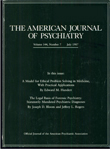Characteristics of Borderline Personality Disorder Associated With Suicidal Behavior
Abstract
OBJECTIVE: This study examined the relationship between characteristics of borderline personality disorder and suicidal behavior. The authors hypothesized that a specific feature of borderline personality disorder, impulsivity, and childhood trauma, a possible etiological factor in the development of impulsivity, would be associated with suicidal behavior. METHOD: Information on lifetime history of suicidal behavior was obtained from 214 inpatients diagnosed with borderline personality disorder by structured clinical interview. The authors examined the relationship between DSM-III-R criteria met and the following measures of suicidal behavior: presence or absence of a previous suicide attempt, number of previous attempts, and lethality and intent to die associated with the most lethal lifetime attempt. RESULTS: Impulsivity was the only characteristic of borderline personality disorder (excluding the self-destructive criterion) that was associated with a higher number of previous suicide attempts after control for lifetime diagnoses of depression and substance abuse. Global severity of pathology of borderline personality disorder was not associated with suicidal behavior. History of childhood abuse correlated significantly with number of lifetime suicide attempts. CONCLUSIONS: The trait of impulsivity is associated with number of lifetime suicide attempts and may therefore be a putative risk factor for a future suicide attempt. If so, impulsivity is a potential target therapeutically for prevention of future suicide attempts. The association between childhood abuse and number of lifetime suicide attempts is consistent with the hypothesis that childhood abuse is an etiological factor in the development of self-destructive behaviors. (Am J Psychiatry 1997; 154:1715–1719)



